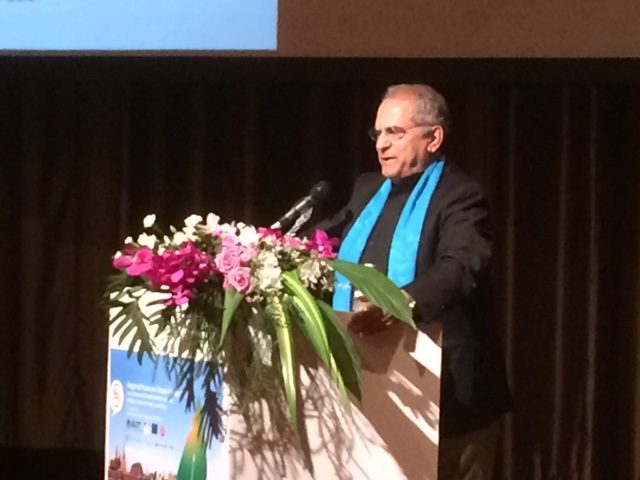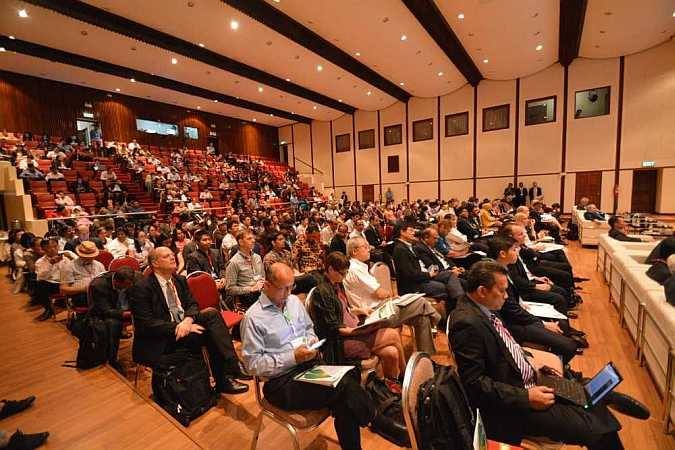SUMMARY
This is AI generated summarization, which may have errors. For context, always refer to the full article.

BANGKOK, Thailand – As one of the most vulnerable to the effects of climate disruption, Southeast Asia has a lot at stake in the ongoing negotiations towards a global climate agreement, diplomats say.
The region’s economic growth, wealth, and regional integration has been largely a success story, but it has altered the region’s environment in negative ways, said Larry Maramis, Director for the ASEAN Secetariat’s Cross-Sectoral Cooperation Directorate, during the Regional Forum on Climate Change (RFCC) in this city Wednesday, July 1.
Maramis said the impact of extreme climate events in the region have “shaken fundamental assumptions of regional cooperation,” and this, he said, should make the region move faster in addressing extreme events.
Because ASEAN is one of the areas most vulnerable to climate change – from floods and droughts to coral reef bleaching and typhoons – the region has a “great stake and abiding interest in international and regional response towards climate change,” said Maramis.Philippe Zeller, the French government’s ambassador for COP21 for Asia, said that the December conference will “set out a collective ambition” and “address the expectations of all countries, particularly the most vulnerable,” including ASEAN nations. 
Philippe Zeller, the French government’s ambassador for COP21 for Asia, said that the December conference will “set out a collective ambition” and “address the expectations of all countries, particularly the most vulnerable,” including ASEAN nations.
Philippe Zeller, the French government’s ambassador for COP21 for Asia, said that the December conference will “set out a collective ambition” and “address the expectations of all countries, particularly the most vulnerable,” including ASEAN nations.
“We will not win the battle for development and for eliminating poverty, without winning the battle for climate change,” Zeller said.
Across the region, governments and citizens are aware of their countries’ vulnerabilities, the envoy said, during a separate session with Southeast Asian journalists Thursday, July 2.
However, on a regional level, there is “not so much coordination” between the countries on a range of climate-related issues, such as energy, Zeller said.
Despite this, he said that the ASEAN member-states are already active in different groups in the ongoing negotiations for the climate deal, but said that more could be done by the region acting as one solid block.
Promise of Paris
The experts and officials are also hopeful that the upcoming Conference of Parties in Paris in December will finally achieve a landmark agreement for the planet.
“Conditions are there for achievement for COP21 in Paris, but it will require compromise from all sides,” said Jose Ramos-Horta, former president of Timor-Leste.
Ramos-Horta said the “credibility of France is at stake” in this talks, and that the French diplomatic machine is in overdrive to urge all parties in working towards an agreement.
If an agreement is reached, it would just be the “first, albeit most significant, step in instituting a more climate-stable future,” said Dr. Pichet Durongkaveroj, Minister for Science and Technology, Royal Thai Government.
“What will be required more and more in the days to come is climate-evidence-based policy to foster on-the-ground implementation of remedial measures,” Durongkaveroj said.
In a video message, Nicolas Hulot, special envoy of the French president for the environment, said that the world “have not reached an impasse” on the issue.
“For the first time in the history of international relations, there is a challenge facing all continents and all cultures, which requires us to join forces, not on shared ground but on a shared concern, and to pool our best resources,” Hulot said.
“It is up to politicians to show statesmanship on a global scale – and diplomats and politicians will be held responsible for any failure in Paris,” Ramos-Horta added.
The RFCC, which runs from July 1 to 3 at the Asian Institute of Technology (AIT), brings a range of stakeholders, from policy-makers to scientists, to discuss the scientific and policy aspects of climate change in the lead-up to the Paris conference later this year.
The conference is organized by the AIT, the French Ministry of Foreign Affairs and International Development, ASEAN, and the European Union. – Rappler.com
Add a comment
How does this make you feel?
There are no comments yet. Add your comment to start the conversation.